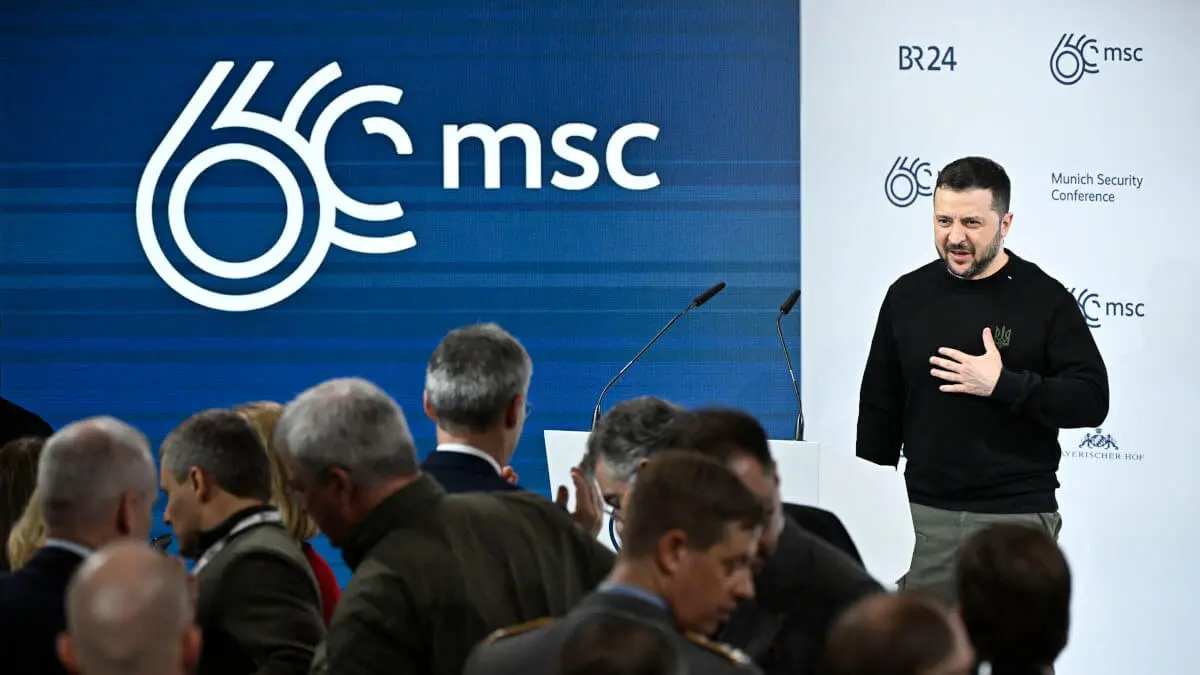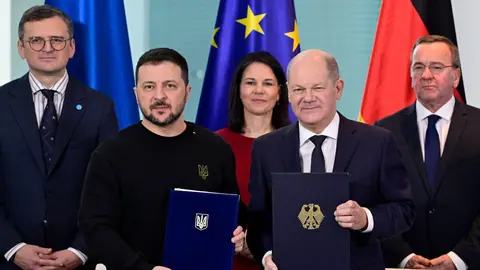Gaza and Ukraine take centre stage at Munich Security Conference

As expected, the wars in Ukraine and Gaza took up most of the attention at the Munich Security Conference this past weekend. In addition to these two issues, the agenda of this summit - which aims to address and analyse the main threats to global security - also included EU-US relations and the security challenges in Africa, Asia and Latin America.
One of the most relevant and eagerly awaited interventions was that of Ukraine's President Volodimir Zelensky, who once again called for financial and military assistance from his allies to confront Russia's invasion, which will be two years old this month.
According to Zelensky, this support must be long-term, emphasising the shortage of ammunition and personnel. In this regard, it is worth noting that the Ukrainian leader has recently reached security agreements with France and Germany that address these two aspects: the supply of ammunition and military training.
"We have shown that we can force Russia to withdraw," said Zelensky, who assured that lost territory can be regained. "Putin can lose. This has already happened more than once on the battlefield," he added.
In my speech at the Munich Security Conference, I warned of the catastrophic threats that the Russian regime poses to Europe and the world, not just Ukraine, and outlined collective steps to counter them, preserve the rules-based order, and make security a reality again.
— Volodymyr Zelenskyy / Володимир Зеленський (@ZelenskyyUa) February 18, 2024
🧵 pic.twitter.com/e6jHEs8Owg
As the first day of the Munich summit was underway, the IK-3 prison in the Russian Arctic town of Jarp announced the death of political prisoner Alexei Navalny.
As Western leaders stressed during the meeting, Putin is not only to blame for the war in Ukraine, which is now entering its third year, but also for the death of the Russian opposition figure, who years ago suffered an assassination attempt.
His widow, Yulia Navalnaya, who also took part in the conference, said that the Russian president would pay for Navalny's death. "Putin and his entire entourage will be punished for what they have done to our country, my family and my husband," Navalnaya said.
La viuda de Navalny, Yulia Navalnaya, acaba de tomar la palabra en la Conferencia de Seguridad de Munich. Pide a la comunidad internacional que responsabilice al régimen de Putin de la muerte de su marido.
— Xavier Colás (@xaviercolas) February 16, 2024
Tras bajar de la tribuna, recibe una gran ovación.
Via @KevinRothrock pic.twitter.com/9pcwALbuft
Iran, a global threat
In addition to Ukraine and Russia, another war that is garnering international attention for its relevance and potential regional and global consequences is the conflict between Israel and Hamas.
This war, according to Israeli Foreign Minister Israel Katz, "is not Israel's war", but "the war of the free world against fundamentalist Islamism".
The Israeli Foreign Minister also highlighted Iran's role in destabilising the region through its support for terrorist groups in the Middle East, including Hamas. However, for Katz, the threat posed by Tehran is not limited to the Middle East, but is a global problem.
מעל הבמה בוועידת הביטחון במינכן @MunSecConf, בפעם הראשונה שלי בגרמניה, עמדתי כשר החוץ של מדינת ישראל ואמרתי לעולם באופן ברור: נשמיד את אויבנו. יהיה המחיר אשר יהיה.
— ישראל כ”ץ Israel Katz (@Israel_katz) February 17, 2024
צפו >>> pic.twitter.com/YyjgZhBdLP
"If Iran were to have atomic weapons, it would feel empowered enough to finance other terrorist gangs and create other Gaza stripes in Berlin, Munich, Paris, London or even Moscow, even though Russia is now its ally," Katz said in his speech.
US Secretary of State Antony Blinken made a similar point about Iran, calling the ayatollahs' regime "the number one threat" not only to Israel, but to many other nations.
Met with President @Isaac_Herzog in Munich on efforts to secure the release of hostages and enable an extended humanitarian pause. I underscored the need to achieve lasting peace in the region, with security for both Israelis and Palestinians. pic.twitter.com/YlnubmEHaZ
— Secretary Antony Blinken (@SecBlinken) February 17, 2024
While no Iranian government representatives were invited to the summit, Iranian activists and opponents such as prominent journalist Masih Alinejad, who again called from Munich for the designation of Iran's Revolutionary Guard as a terrorist organisation, participated.
I challenged German FM @ABaerbock & @SecBlinken at @MunSecConf on the lack of unity among democratic countries in order to take actions against the greatest sponsor of terrorism.
— Masih Alinejad 🏳️ (@AlinejadMasih) February 17, 2024
You cannot end the war in Ukraine without confronting regime in Iran.
pic.twitter.com/pCZZqkiLPM
Europe must strengthen its defence and unity
The final day of the Munich summit revolved around geopolitical issues that directly affect the European Union, such as the war in Ukraine and Gaza, but also the situation in the countries of the South and EU defence.
For Josep Borrell, head of European diplomacy, these new challenges have forced European countries to work "faster and better". Borrell gave as an example the divisions over sending military supplies to Ukraine, indicating that if this decision had been taken earlier, "perhaps the war would have been different".
To be a geopolitical player, the European Union needs to build a strong defence capacity and be united.
— Josep Borrell Fontelles (@JosepBorrellF) February 18, 2024
We are in a war situation that requires a different approach: from Ukraine to Gaza, the Member States must act together, quicker and better.#MSC2024 pic.twitter.com/7cRtQ4oiTx
Also, on the war in Gaza, Borrell said that European countries need to be more united "if we want to play a geopolitical role on this issue".
In addition to the need for unity in Europe, European defence needs to be reorganised and strengthened. In the words of conference chairman Christoph Heusgen, Europe "cannot afford to wait any longer to organise European defence", stressing the need to strengthen the EU's defences and devote more funds to this end.









